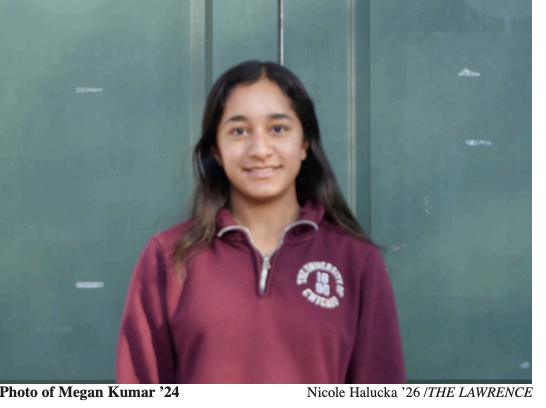Thursday, April 24
Changing the Future of Medicine: Megan Kumar
Megan Kumar '24 and Ellen Jordan '26 (145th Executive Editor) in News | October 27, 2023

In a world where the use of artificial intelligence (AI) is becoming far more prevalent, many fields are looking for areas in which AI can serve new purposes. Take Megan Kumar ’24. This year, as part of an independent project in collaboration with researchers at the Mayo Clinic and under the mentorship of Lawrenceville Science Teacher Shinae Park, Kumar applied AI technology to medical advancement. The focus of her project was on gastrointestinal (GI) bleeding, a disorder of the digestive tract that could even be life-threatening. Specifically, Kumar created an AI program that can analyze different cases of GI-bleeding and predict their severity and the urgency of treatment.
Reflecting on her original inspiration for the project, Kumar said, “My mom is a gastroenterologist, so when I was younger I would spend my weekends goin/,.m /,.mg with her to the ER, and 90 percent of the time it was for GI-bleeding.”
Throughout her childhood, she was also exposed to some of the hardships of working in the gastrointestinal field, as her mother was often called upon early in the morning to treat patients who were not actually in critical condition. In hopes of minimizing the number of similar situations where doctors are called into the hospital at inconvenient times to treat non-pressing cases—Kumar decided to work on a program that could assess GI-bleeding cases and determine their urgency.
Kumar’s Brazilian background also served as an inspiration for her project. Having visited her mother’s native country on multiple occasions and witnessed first-hand the poverty and lack of access to healthcare in various Brazilian cities, Kumar saw the virtue of a digital GI program that would be more accessible to low-income communities.
“Another aspect of this project is targeting healthcare disparity, because it’s a model which basically copies the mind of a doctor, making it accessible to anyone in the world,” Kumar elaborated. To use Kumar’s program, doctors simply plug in the patient’s vitals and other variables such as heart rate, age, and gender. After this information is entered, the AI program can then assess the severity of the particular case.
“The model is taking all this patient data on heart rate, blood urea nitrogen (BUN) values, and other variables and predicting the location of the bleeding and whether or not the endoscopy [a method of treatment for GI-bleeding] has to happen immediately,” Kumar explained.
Developing this program, however, was not easy, and Kumar encountered various obstacles during the process. Some difficulties she faced included designing the actual website for the program, conducting online research, and experimenting with different aspects of the code.
While Kumar believes that plenty of ways exist in which AI can be applied within the medical field, she also acknowledges its limits. “I don’t think that [AI] can entirely supplement a human doctor right now, just because it’s so new, and I don’t know if it will ever be able to…but I think that it’s a tool that doctors definitely can use,” she said.
Through her research, Kumar hopes that healthcare tools and new technology have the potential to save lives become more accessible to both the general public and low-income communities in developing areas. Kumar plans to submit her project to the prestigious Regeneron Science Talent Search (STS) competition on November 8.
Related Articles
- Announcing: Valedictorian, Aurelian Speakers, and Faculty Speaker Sophie Liu ’27
- Welcoming Our New VPs for 2025-2026 Sophie Liu ’27
- Leo Min Takes the Win: The 2025-26 Student Body President Presents to You...ZUMBA Sophie Liu ’27
- Farewell to the V Formers of The Lawrence CXLIV Sophie Liu ’27
- Black History Month: Afrofest & Panels Angel Xin ’26 and Dorothy Lee ’26
Recent Articles
- Announcing: Valedictorian, Aurelian Speakers, and Faculty Speaker Sophie Liu ’27
- Senior Profile: Sophie Cheng ’25 Katherine Qiu ’27
- Debunking the Dining Hall Debate: Is Lawrenceville’s Dining Really That Bad? Isabelle Lee ’27
- Welcoming Our New VPs for 2025-2026 Sophie Liu ’27
- A Sweet Return: Melba Reopens with New Flavors and Community Spirit Ella Song ’27